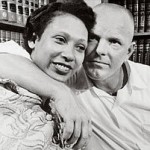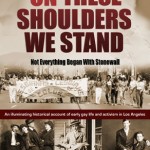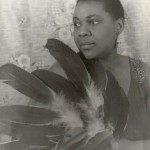Articles in History
What Loving, and loving, are all about

On this date 45 years ago, the U.S. Supreme Court issued its decision in the case of Loving v. Virginia, a landmark case which declared Virginia’s Racial Integrity Act of 1924 unconstitutional, and ending all race-based legal restrictions on marriage in the U.S. Today is a good day to remember Mildred and Richard Loving and the freedom to marry they won for people of different races who love one another. May we one day also — and soon — celebrate our own freedom to marry.
On These Shoulders We Stand: Early gay life and activism in L.A. — June 5–6 in Anchorage

Not everything began with Stonewall. On These Shoulders We Stand is an illuminating historical account of early gay life and activism in Los Angeles told by the people who lived it. For those of us who supported Prop 5, this film provides perspective and inspiration. The film will be followed by a conversation with the filmmaker, Glenne McElhinney, and local activists. Three showings during Pride Week in Anchorage on Tuesday and Wednesday, June 5–6.
Trevor Storrs: Grand Marshal for Alaska Pride Fest 2012

Trevor Storrs will be the Grand Marshal for Anchorage’s 2012 Celebrating Diversity Parade, Alaska Pride Fest announced Saturday. The Celebrating Diversity Parade, to be held on Saturday, June 9, is part of Alaska Pride Fest 2012.
“I Am My Own Wife” by Doug Wright this weekend at Out North

The Pulitzer Prize-winning I Am My Own Wife by playwright Doug Wright plays one weekend only at Out North.
Bessie Smith, singer (Black History Month)

Bessie Smith was the most popular female blues singer of the 1920s and 1930s, known as the Empress of the Blues, and was a major influence on subsequent jazz vocalists. Bent Alaska presents her story as part of our celebration of Black History Month 2012.
Peter J. Gomes, minister and theologian (Black History Month)

Peter J. Gomes, a “Christian who happens as well to be gay,” was a minister and professor at Harvard University who argued that the Bible is not racist, anti-Semitic, anti-feminist, or anti-gay. Bent Alaska presents his story as part of our celebration of Black History Month 2012.
Audre Lorde, poet and writer (Black History Month)

A self-proclaimed “Black, lesbian, mother, warrior, poet,” Audre Lorde was a Caribbean-American poet, writer, and activist in the civil rights, antiwar, and feminist movements. Bent Alaska presents her story as part of our celebration of Black History Month 2012, with thanks to GLAAD and the Equality Forum.
James Baldwin, author (Black History Month)

James Baldwin was an African-American and gay writer whose novels and essays captured the conflicted spirit of late 20th century America. Bent Alaska presents his story as part of our celebration of Black History Month 2012, with thanks to GLAAD and the Equality Forum.
Bent Alaska celebrates Black History Month

February is Black History Month. Bent Alaska will be carrying a number of features and stories this month in celebration of Black History Month, and celebrating the lives and achievements of Black LGBTQ people in particular.
Remembering Harvey Milk

Today marks the anniversary of the death of Harvey Milk, assassinated in 1978 by Dan White. Bent Alaska presents his story with thanks to the Equality Forum.
Harvey Milk
 “The important thing is not that we can live on hope alone, but that life is not worth living without it.”
“The important thing is not that we can live on hope alone, but that life is not worth living without it.”
Harvey Milk (born May 22, 1930, died November 27, 1978) became the first openly gay man to be elected to public office in the U.S. when he was elected to the San Francisco Board of Supervisors in 1977. He served eleven months before he was assassinated. Milk was posthumously awarded the Presidential Medal of Freedom in 2009.
Harvey Milk, a New Yorker, migrated to San Francisco in the 1970s, when an influx of gay immigrants from across the country was changing the Castro neighborhood into the city’s gay village. Milk opened a camera store and founded the Castro Valley Association of local merchants. His willingness to represent the interests of local merchants with city government earned him the unofficial title of “the Mayor of Castro Street.” Milk discovered that he had a natural flair for politics.
Milk was a political outsider and a populist who made his own rules. From his shop in the Castro, he ran grassroots campaigns based on relentless meetings, door-to-door canvassing, and media interviews. His supporters formed “human billboards” by standing along major thoroughfares holding placards. Milk’s first three tries for office were unsuccessful, but gave him increasing credibility with the electorate.
When Milk was elected to the San Francisco Board of Supervisors in 1977, a 68-year-old lesbian wrote, “I thank God I have lived long enough to see my kind emerge from the shadows and join the human race.”
Milk was shot to death in his City Hall office on Nov. 27, 1978, by Dan White, a conservative anti-gay former supervisor who also murdered Mayor George Moscone. White was convicted of manslaughter and sentenced to five years imprisonment. City-wide violence erupted in San Francisco when White’s sentence was announced.
Harvey Milk had forebodings of his assassination. He left a tape-recorded “political will” naming his preferred successor on the Board of Supervisors. On that tape he said: “If a bullet should enter my brain, let that bullet destroy every closet door.”
Milk became well-known in his lifetime for variations of what was called his “Hope Speech.” Here is as it was heard in the award-winning documentary “The Times of Harvey Milk” (1984):
For more about Harvey Milk, visit his LGBT History Month page or Wikipedia article.





















